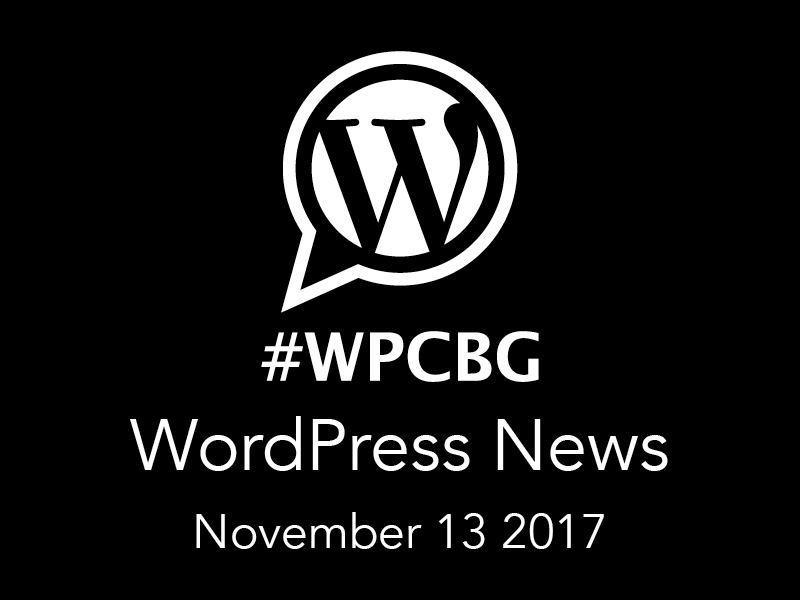Hello, here are the notes from the WordPress News section tonight’s WordPress Cambridge meeting (November 13, 2017).
Slides are here (all content is replicated in the post below, so take your pick):

WordPress News is a new part of the meetup. A quick 10 minute update on all things WordPress. Feel free to give feedback on the presentation.
Top Stories
WordPress 4.9 due to be released tomorrow
For full feature summary see: https://codex.wordpress.org/Version_4.9
New features include:
Save and Schedule Theme Changes in Customizer
WordPress 4.9 will introduce saving theme customizations as draft. Now when you make changes to a theme using the customizer, you will have an option to save your changes as a draft instead of making them live.
This new feature will also allow you to share the preview of changes with a url. You can send this URL to any user, and they will be able to see your website with the changes made in that particular draft.
Want to publish your theme changes at a specific time? WordPress 4.9 will also allow you to schedule changes.
For more information on this see:
http://www.wpbeginner.com/news/whats-coming-in-wordpress-4-9-features-and-screenshots/
https://make.wordpress.org/core/tag/4.9+dev-notes/
Add shortcodes and embedded media into widget areas
WordPress 4.8 brought media widgets including rich text, audio, image, and video. WordPress 4.9 will introduce the new gallery widget, as well as shortcodes and embedded media.
This will allow users to better access to adding content into widget areas. For example sidebars, header and footer areas.
As an example contact form plugins often generate a shortcode which you add to a page or post to display. Now you will be able to also add such a form to a footer on your site.
See: https://wptavern.com/wordpress-4-9-will-support-shortcodes-and-embedded-media-in-the-text-widget
Better user management for activating plugins
It is now possible to manage capabilities for activating and deactivating plugins more granularly through the following new capabilities:
activate_plugin checks whether a user can activate a specific plugin. When checking the capability, it gets passed the plugin file (such as current_user_can( ‘activate_plugin’, ‘my-plugin/my-plugin.php’ )).
deactivate_plugin works similar to activate_plugin, but checks whether a user can deactivate a specific plugin as the name indicates.
deactivate_plugins allows to check whether a user can generally deactivate plugins
See: https://make.wordpress.org/core/2017/10/15/improvements-for-roles-and-capabilities-in-4-9/
WordPress 4.9 Protects Users From Fatal Errors Created in the Theme and Plugin Editors
Over the years, there have been many discussions and debates on whether or not WordPress should have a built-in file editor for themes and plugins. The file editors, while convenient, allow users to easily trigger fatal errors that can be difficult to fix, especially if they don’t have FTP access.
Instead of removing the editors from core, the WordPress development team has enhanced them by adding fatal error protection in WordPress 4.9. When a user accesses the theme or plugin editor for the first time, they’re presented with warnings.
If you try to save changes to a file and WordPress detects a fatal error, the change is not saved and a warning message is displayed that explains where the error occurred
In addition to safety features, the code editors are powered by CodeMirror, an open-source, JavaScript powered text editor that adds features such as line numbers. The plugin editor includes the ability to look up documentation for filters, hooks, and actions with many of the links pointing to the new WordPress Developers Resource site.
Better mapping for widget areas when switching between themes
Sometimes widget areas and even menus could become ‘lost’ when switching themes, because different themes have different names for menus and widget areas. 4.9 tries to fix this by trying to match up widget and menu areas from one theme to another.
Other news
GDPR for WordPress Project Seeks to Provide a Standard for Plugin Compliance
WordCamp Denmark organizer Kåre Mulvad Steffensen and WP Pusher creator Peter Suhm are working on a GDPR for WordPress project that aims to provide an industry standard for getting plugins compliant with EU General Data Protection Regulation (GDPR) legislation. The deadline for compliance is May 28, 2018, approximately 200 days from now.
Woocomerce – Introduces Robot Ninja
A tool to provide continuous testing of your site’s storefront, which provides warning if functionality fails, so you can make quick corrections and avoid a loss of sales
Find out more at https://robotninja.com/blog/introducing-robot-ninja/
Gutenberg Development Advances
Up until the release on October 24, Gutenberg did not support the meta boxes that so many WordPress content creators rely on. The new editor now has initial support for meta boxes as well as a host of other critical features for content creation.
WordPress 4.8.3 Security Release
At the end of October, WordPress 4.8.3 was released containing an important security fix for all previous versions of WordPress. If your WordPress installation has not updated automatically, please update it now to protect your site.
Take the 2017 Annual WordPress User Survey
The annual WordPress User Survey is a great opportunity for you to provide your feedback about how you use WordPress. This year is no exception, as the 2017 WordPress User Survey is out now. See https://wordpressdotorg.polldaddy.com/s/wordpress-2017-survey